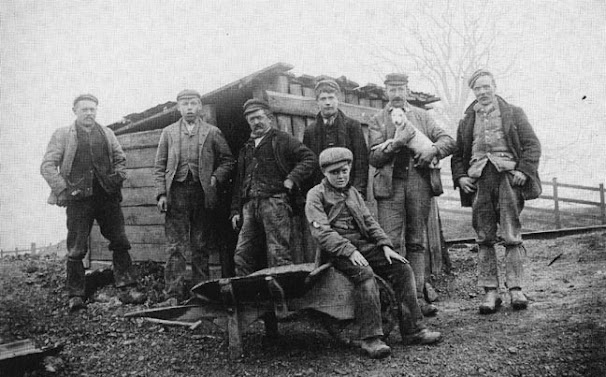Working mostly with pick and shovel, navvying demanded strength and great physical stamina. A lot of navvies had previously worked as agricultural labourers, and doubtless they were accustomed to hard, tiring work. Even so, it was said that it took up to a year to turn a common labourer into a navvy capable of excavating twenty tons of earth in a day. However, with children of less than ten years old often working as navvies with their fathers and older brothers, and with men navvying well into their sixties and seventies, lighter duties were routinely available.
All parts of the country produced navvies, and although many did travel either alone or with their employers to work on projects right across Britain, contractors also recruited men from the nearby towns and villages close to the construction site. Interestingly, it is often thought that the majority of navvies were Irish, but this was not the case. Large numbers of Irish men did travel to Britain and become navvies, as work was more plentiful and the jobs were invariably better paid, but these represent a minority of the thousands of men required for the construction of the canals.
Just up river from me is a perfect example of the type of work undertaken. There was a need to carry coal from Wigan to Kendal and limestone the other way round. It was called the Black and White.
Construction of the canal was by hand, using pick, shovel and wheelbarrow principally through clay with excavated clay used to construct embankments. Puddled clay up to 3 ft thick was used to watertight the canal with the workers using their bare feet to stamp up and down on the clay to drive out air bubbles. Sometimes cattle were used.
However, to get across the River Ribble was a problem. Original plans were to construct a beautiful viaduct such as that across the Lune in Lancaster but the money ran out so the versatility of the surveyors and navvies was put to the test. The resulting construct is known now as the Old Tram Road. I’m not going to go into the design and build of the path, bridge and incline as it would take too long.
If you can get hold of a copy then Steve Barritt’s book ‘The Old Tram Road’ is fascinating.
Incidentally, the replacement of the bridge has now started. Fantastic.
I mentioned that the Navvie’s pay was higher than average and in 1802 the Lancaster Committee queried the 2s to 2s 6d per day wages that they were paying the tramroad workers. The Clerk to the Committee had to explain:
As canal work is so very laborious , they must give such wages as will be the means of procuring and calling forth the utmost exertions of able Workmen; so that although the wages paid by the contractors may be higher than for common Workmen in the adjoining country, yet when compared with the quantity of Work performed, it is by much the cheaper.
It was estimated that one man digging in good ground could excavate twelve cubic yards during a typical ten hour shift. They worked a six day week in all weathers and slept rough in whatever places could be found local to where they were working.
 |
| the Canal network |
Songs of a Navvy
Patrick MacGill (the navvy poet) (1911)
L’ENVOI – TO MY PICK AND SHOVEL
When the last, long shift will be laboured, and the lying time will be burst,
And we go as picks or shovels, navvies or nabobs, must,
When you go up on the scrap-heap and I go down to the dust,
Will ever a one remember the times our voices rung, When you
were limber and lissome, and I was lusty
and young?
Remember the jobs we’ve laboured, the heartfelt songs
We’ve sung?
Perhaps some mortal in speaking will give us a kindly thought –
“There is a muck-pile they shifted, here is a place where they wrought.”
But maybe our straining and striving and singing will go for nought,
When you go up on the scrap-heap, and I go down to the dust –
(Little children of labour, food for the worms and the rust,)
When the last long shift will be laboured and the lying time will be burst.
Thanks for reading. Comments welcomed. Terry Q.


5 comments:
Interesting read as always Terry - such an amazing engineering feat those canals - gruelling work - a credit to the navvies. Lovely to read a poem from a navvie’s perspective - his own voice.
Fascinating. That was one hell of an undertaking. How many miles of canal? And I didn't know it was mostly local labour.
I learnt a lot from your blog, particularly interested because in researching my family tree, I discovered ancestors on both sides of my family were boatmen, working the canals transporting goods. Good choice of poem I didn't know 'navvies' came from 'navigators'. Thank you, Terry.
So much in here I didn't know. The building of our canal system was transformative for the country and to think it was all accomplished by strong men with shovels is truly extraordinary. I've always wondered why canal water doesn't just soak away. Now I know! I enjoyed MacGill's envoi. Thank you.
They left such a legacy - moving mountains they did - a thankless job - lovely to hear a poem in a navvie's voice.
Post a Comment